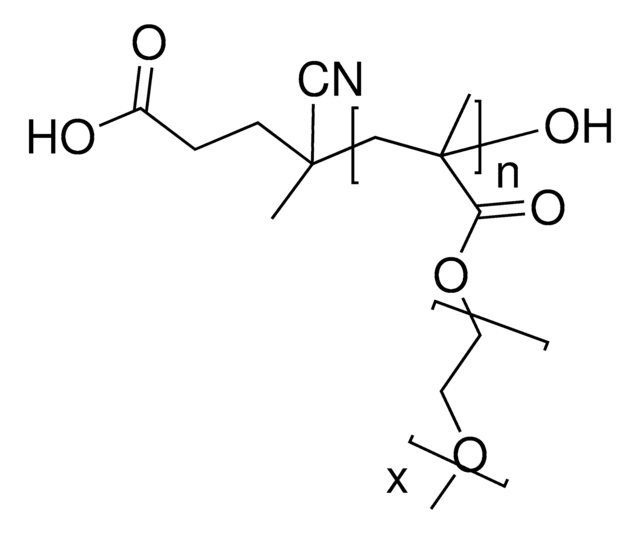447943
Poly(ethylene glycol) methyl ether methacrylate
average Mn 500, methacrylate, methoxy, 100 ppm MEHQ as inhibitor, 200 ppm BHT as inhibitor
Synonym(s):
Polyethylene glycol, Methoxy PEG methacrylate, Methoxy poly(ethylene glycol) monomethacrylate, Poly(ethylene glycol) monomethyl ether monomethacrylate
About This Item
Recommended Products
Product Name
Poly(ethylene glycol) methyl ether methacrylate, average Mn 500, contains 100 ppm MEHQ as inhibitor, 200 ppm BHT as inhibitor
mol wt
average Mn 500
contains
100 ppm MEHQ as inhibitor
200 ppm BHT as inhibitor
reaction suitability
reagent type: chemical modification reagent
reaction type: Polymerization Reactions
refractive index
n20/D 1.496
mp
−1-2 °C
density
1.08 g/mL at 25 °C
Ω-end
methacrylate
α-end
methoxy
polymer architecture
shape: linear
functionality: monofunctional
Looking for similar products? Visit Product Comparison Guide
Related Categories
General description
signalword
Warning
hcodes
Hazard Classifications
Eye Irrit. 2 - Skin Irrit. 2 - Skin Sens. 1 - STOT SE 3
target_organs
Respiratory system
Storage Class
10 - Combustible liquids
wgk_germany
WGK 1
flash_point_f
Not applicable
flash_point_c
Not applicable
ppe
dust mask type N95 (US), Eyeshields, Faceshields, Gloves
Choose from one of the most recent versions:
Already Own This Product?
Find documentation for the products that you have recently purchased in the Document Library.
Customers Also Viewed
Articles
Designing biomaterial scaffolds mimicking complex living tissue structures is crucial for tissue engineering and regenerative medicine advancements.
Our team of scientists has experience in all areas of research including Life Science, Material Science, Chemical Synthesis, Chromatography, Analytical and many others.
Contact Technical Service










